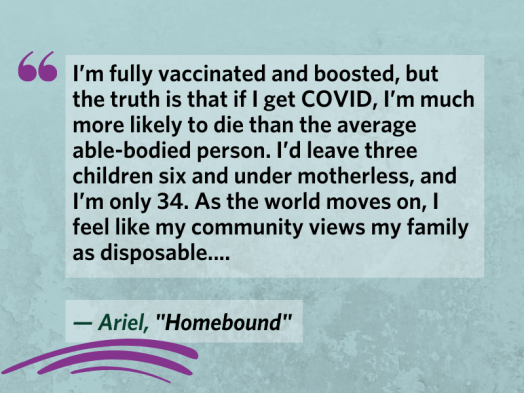by Ariel Grucza

My first child was born in 2015, and my partner and I had planned to homeschool long before that. In many ways, that put me at an advantage in March 2020—my life was not in the same type of upheaval as many of my friends whose children went to brick-and-mortar schools. I never scrambled to find a childcare provider and my kids never needed to make a considerable schedule adjustment—our lives were already centered around learning at home. While many families in our social circle felt the weight of isolation from working from home and virtual school, our lives hadn’t changed much.
Sure, we weren’t going on the field trips and day trips that were common in our pre-pandemic lives, but we didn’t feel isolated. While the rest of the world seemed to be in crisis, our days continued more or less normally. We chose to take significant precautions, and when most of our small-town community decided not to observe our state’s mask mandates, we packed up and moved to a more compliant area. We bought a house with a big yard, a trampoline, a swing set, and our kids had plenty of access to socially isolated outside play.
Fast forward two years to March 2022 and the rest of our state seems to be operating as if the pandemic is over. For our family—two disabled parents, one immune-compromised, and two children too young to be vaccinated who were born at 28 weeks—isolation has set in hard. While we were prepared to school at home forever, we weren’t prepared to stay at home forever.
With so many people no longer masking in public—let alone wearing high-quality respirators like N95s or KN94s—a Costco trip seems potentially perilous. A field trip to a museum is out of the question.
I’m fully vaccinated and boosted, but the truth is that if I get COVID, I’m much more likely to die than the average able-bodied person. I’d leave three children six and under motherless, and I’m only 34. As the world moves on, I feel like my community views my family as disposable.
Pre-pandemic, I had always assumed that most people had a great deal of caring and compassion for their neighbors, but I no longer feel that I can justify that belief. As able-bodied people return to their everyday lives without observing any pandemic precautions, I think that there’s a clear subtext: the social lives of able-bodied people are worth more than the actual lives of the disabled, chronically ill, immune-compromised, elderly, and those too young to be vaccinated.
As a disabled adult, I’m also keenly aware of long COVID, a complication that many people seem to be barely aware of. Many formerly able-bodied people are now newly disabled adults after contracting COVID, and we still don’t know the long-term impacts of mild or asymptomatic COVID infections. The effect of a significant increase in chronic illness and disability will be startling. So far I see few in our society prepared to discuss how we’re going to handle millions of COVID “long haulers” in the years to come. If my children’s generation sees significant long-term impacts from COVID, will we face an entire generation with severe chronic illness?
I know some of these concerns seem extreme to my able-bodied friends. I think it’s hard for able-bodied people to imagine themselves as permanently disabled, but it’s easy for disabled people to imagine themselves as more disabled. Very few able-bodied people seem to be able to conceptualize a version of themselves that has to choose between taking a shower and making food due to pain or exhaustion. Still, almost every disabled or chronically ill person I speak to can imagine themselves with long COVID—less functional, more medically fragile, with an even more uncertain future.
Our lives have started to seem like they’re at an impasse with the rest of society. While most people are no longer masking indoors, we’re still wearing masks outdoors in any scenario where we might encounter another person. My partner turned down several lucrative employment offers in his field because our family couldn’t justify the safety risk of being exposed to countless unmasked strangers. With few taking even minor precautions to protect the vulnerable, I have no idea when we might be able to participate in life again. When my children ask when we can go on a plane trip, I have no idea what to tell them.
My children treat a trip to Target or Costco like a trip to Disney World. They beg to go on errands, and it breaks my heart. They jump up and down with joy in the parking lot if I relent and sob in despair if I tell them case numbers are just too high right now, or it’s too busy at this time of day, and too few people are masking. My partner and I tried for seven years to get pregnant with my first child—we had lots of time fantasizing about how their childhood would look. This is not the childhood I envisioned for them.
I look forward to the warmer weather of spring and summer, where at least we can wear our masks and go on hikes, find creeks to stomp in, and do nature study in the relatively safe open ventilation of the outdoors. We have a few friends—almost exclusively from families with a disabled parent or child—who take similar precautions, and the nice weather will bring opportunities for masked outdoor playdates. Still, I can’t help resent an ableist society when my children look back at old photos of our pre-COVID life. “When can we go to the planetarium again?” my middle child asks me daily. Maybe next month, I said at first. Then perhaps next summer. Then perhaps next year.


Thank you so much for this. My kids are older but I so feel this. I’m not the only parent around with a compromised immune system, but it often feels that way. I’m just so tired of my kids being the only kids who almost never get to do anything. If everyone was a little bit safer then we could be a lot safer.
LikeLike